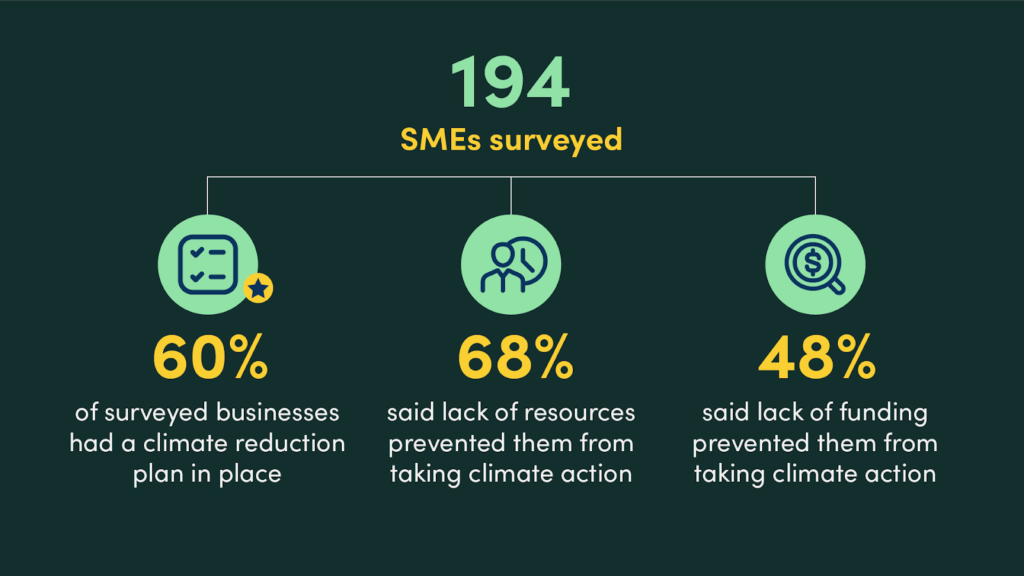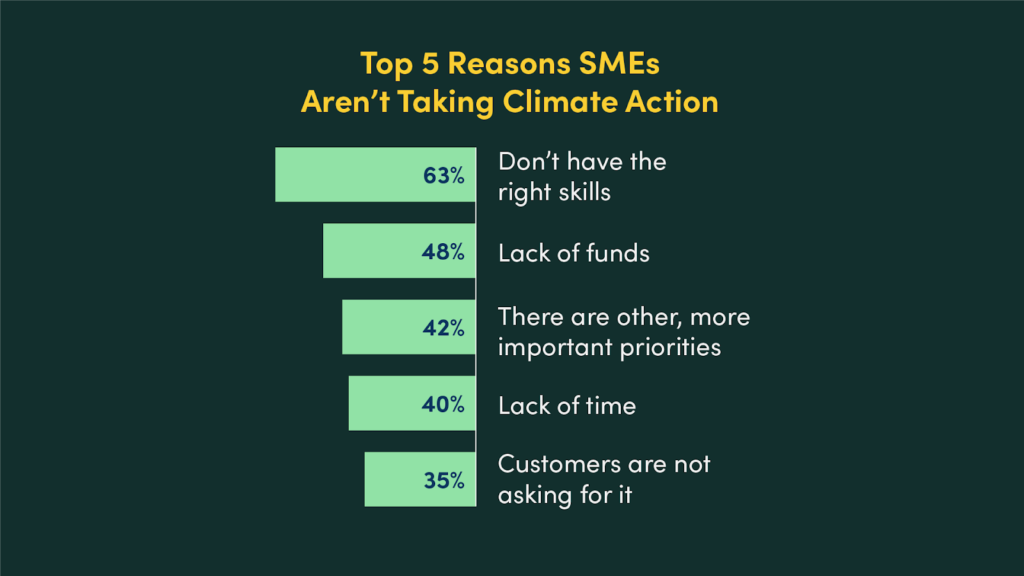Survey: small businesses face recurring barriers to carbon reduction
The SME Climate Hub surveyed its community of small to medium-sized businesses (SMEs) committed to climate action to address gaps in resources and guidance preventing immediate emissions reductions.
To prevent the worst effects of climate change and meet the global targets laid out in the Paris agreement, it’s vital that small to medium-sized enterprises (SMEs) reduce their carbon emissions.
SMEs are often classified as businesses with fewer than 500 employees. Though any single SME’s climate impact may seem small at first glance, the combined effect of the category is sizable, with SMEs making up 90% of business worldwide.
Additionally, SMEs are often suppliers to larger companies, providing the services, products and resources that create the corporation’s end product. When a corporation has a large carbon footprint, much of that may actually stem from small businesses in their supply chain, making up the category known as Scope 3 emissions. According to CDP, supply chain emissions are 11.4 times higher than operational emissions, or the emissions produced within the corporation’s own walls.
For SMEs, the benefits of taking climate action extend beyond lessening their climate impact – or that of their biggest customers. Small businesses which choose to invest in reducing their emissions can see numerous short and long term business advantages, including:
- Improved efficiency and reduced operating costs
- Complying with carbon legislation
- Lower business risk
- Enhanced access to capital and affordable insurance
- Unique growth opportunities
- More resilient supply chains
With these financial, branding, and growth benefits, why would an SME not take steps to reduce its carbon footprint?
Survey: what’s preventing SMEs from reducing their emissions?

The SME Climate Hub – a UN-backed initiative engaging small and medium-sized businesses in the Race to Zero – conducted a survey to explore what barriers are preventing SMEs from reducing their emissions.
Nearly 200 small and medium sized businesses committed to the SME Climate Hub shared their insights.
These businesses are committed to taking climate action, rating emissions reduction a high priority, or on average an 8 out of 10. In the near-term, SMEs are making efforts to cut their greenhouse gas emissions through reductions to energy consumption and waste (82%), employee education (64%), and upgrades to facilities and equipment (52%). However, only 60% of the SMEs in this category have a long-term emissions reduction plan in place. To reach global climate goals, businesses will need to take robust and immediate action in the short and long-term.
The survey found that the most common barrier to SME climate action is a lack of resources, with 68% of the surveyed businesses citing it as a concern. The lacking resources can be personnel, or knowledge, or time to dedicate to the issue.
The second-most common reason cited was a lack of funding, which 48% of businesses reported.

How to help SMEs reduce their emissions
Funding is vital to facilitate climate action, with 69% of SMEs saying they need access to external funds to reduce their emissions faster or at all. In contrast, only 34% of SMEs report being offered a financial incentive to reduce emissions, while 60% of surveyed SMEs said they needed help securing this funding.
Another key piece of the puzzle is supporting SMEs with the proper tools: 36% of surveyed businesses said they needed support measuring emissions and tracking changes, especially in the supply chain.
Providing this needed support will require a collaborative, cross-disciplinary effort involving large corporations, governments, and NGOs.
The SME Climate Hub & Normative are working together to meet these needs
The SME Climate Hub is an initiative of the We Mean Business Coalition, the Exponential Roadmap Initiative, the United Nations Race to Zero campaign and the International Chamber of Commerce. In collaboration with Normative and the Net Zero team at Oxford University, the SME Climate Hub provides tools and resources to enable SMEs to make a climate commitment, take action, and measure their progress towards emissions reductions.
Following the survey results, the official software provider to the SME Climate Hub Normative developed the Industry CO2 Insights tool which helps SMEs understand their projected emissions profile by showing the carbon footprint of similar businesses in the same industries and regions.
The SME Climate Hub and Normative have also collaborated with CDP and the Exponential Roadmap Initiative to produce a reporting framework for SMEs, making it easier for small to medium-sized businesses to report their progress toward net zero emissions.
“The SME Climate Hub has been a helpful provider of tools and resources to assist us in achieving and sticking to our bold climate goals,” said Jared Meyers, the Chairman of Legacy Vacation Resorts, the United States based hospitality company committed to the SME Climate Hub. “We joined the SME Climate Hub for the plethora of resources, the community of like-minded businesses that set similarly ambitious climate goals, and the opportunity for collaboration and sharing best practices in the process of furthering our climate action journey. Through the SME Climate Hub, we report our annual progress towards our goals and are able to maintain accountability towards these targets.”
The SME Climate Hub allows small businesses to access the resources they need to reduce their emissions and join the Race to Zero – creating a more equitable future that leaves no one behind.
Start your path to net zero emissions today
Join the SME Climate Hub to access free support and guidance to measure and reduce your emissions.

 Go back
Go back






